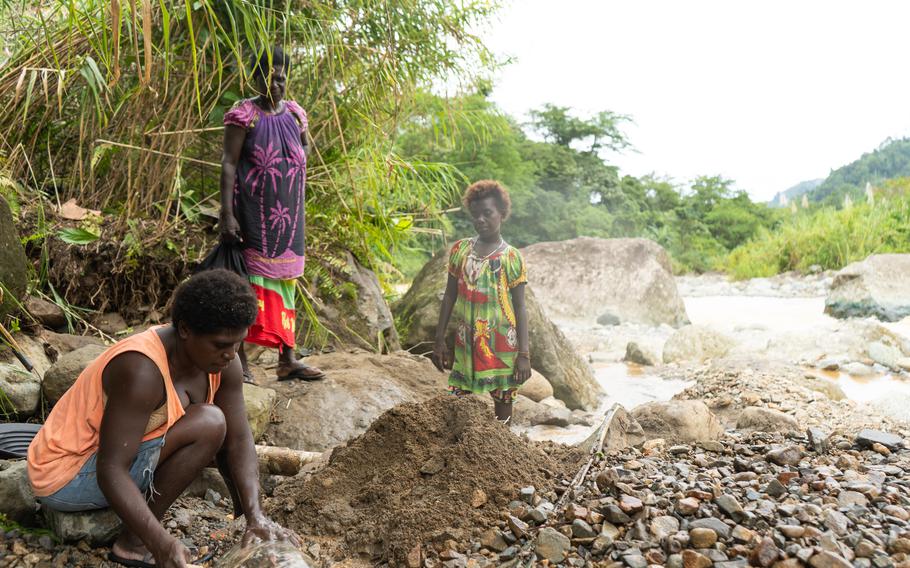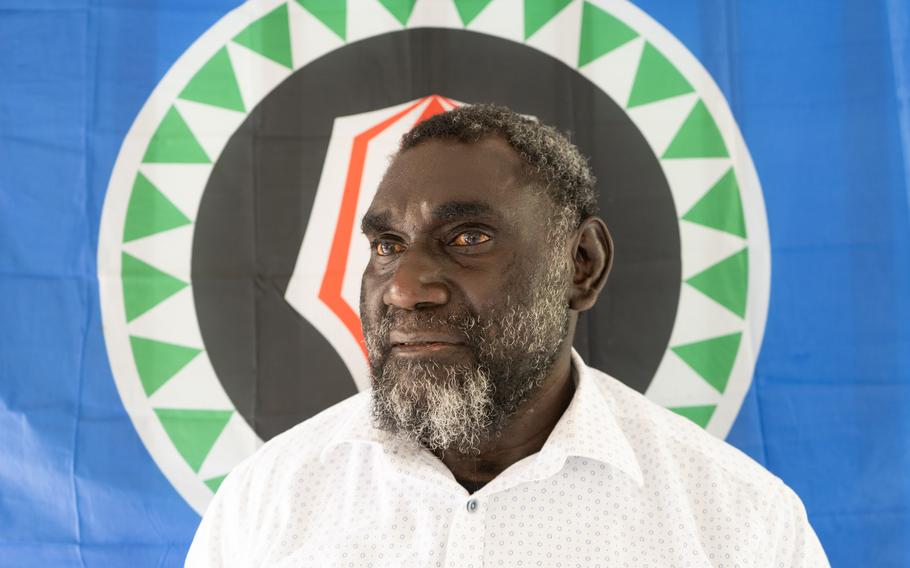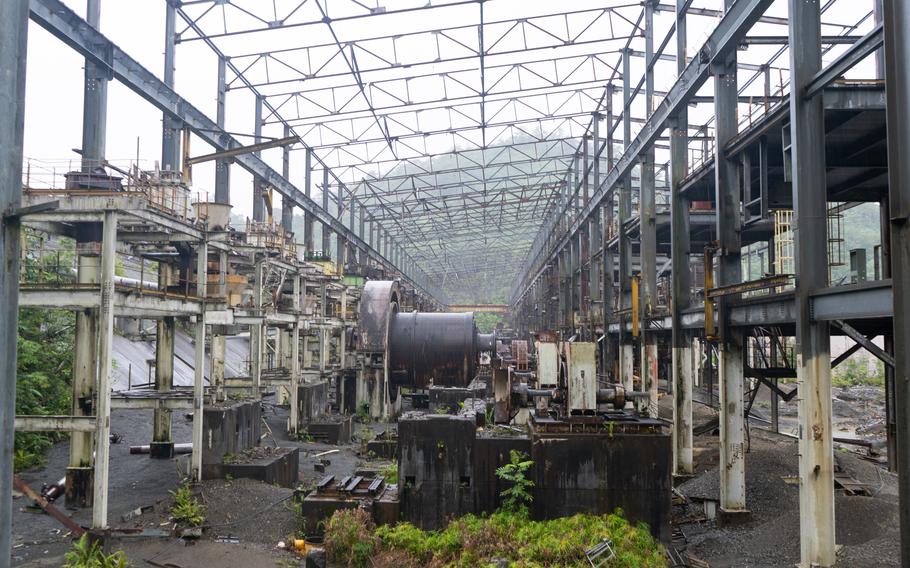
Justina Naviu and her daughter watch a woman pan for gold in the river downstream from the Panguna mine. (Michael Miller/The Washington Post)
ARAWA, Papua New Guinea — On a warm morning in November, a barrel-chested and battle-scarred man arrived to Capitol Hill for a meeting he hoped would help save his struggling homeland.
Ishmael Toroama was introduced to two members of the U.S. House Select Committee on the Chinese Communist Party as the president of Bougainville, an autonomous region of Papua New Guinea in the South Pacific. But his previous occupation was evident in the arm that hung limply at his left side as he shook the lawmakers’ hands.
Twice he’d nearly died while leading the fight for Bougainville’s independence in the 1990s. Now he had come to Washington to try to finish the job.
The man in a pinstripe suit who introduced Toroama was no revolutionary, however. His name was John D. Kuhns, a Wall Street investment banker turned novelist and entrepreneur who had made Bougainville his last big bet.
Together, the two men had a story to tell of a would-be nation in a strategic location starving for freedom, and of a long-shuttered mine still containing as much as $100 billion in copper and gold that could be used in the world’s energy transition — an energy transition where China, with its insatiable thirst for natural resources, is at the forefront.
Toroama had set a 2027 deadline for full independence from Papua New Guinea, after a 2019 referendum in which nearly 98 percent of the population voted in favor. But the result remains subject to ratification by the national parliament in Port Moresby, and talks between the two sides have broken down.
Bougainville could fund its freedom by reopening the Panguna mine and become a staunch U.S. ally, Toroama told Reps. Mike Gallagher, R-Wis., and Neal Dunn, R-Fla., according to Toroama and Kuhns’s account of the meeting. Committee staff confirmed the meeting happened.
Toroama said he told them he needed their help. He had come to Washington to play “the U.S. card,” he said. But some rivals were backed by Beijing, he warned, and even Toroama might have to turn to China if the United States wouldn’t assist.
Kuhns, who wants a piece of Panguna and said he paid for Toroama’s trip, was more explicit.
“Bougainville’s vulnerable status and valuable Panguna Mine have not escaped the attention of the Chinese Communist Party,” he wrote in a brief circulated beforehand. “China has already taken steps to control the Solomon Islands and is intent on doing the same across the South Pacific. Unless Ishmael Toroama and his supporters can resist, Bougainville could be next.”
It was an ominous warning, delivered to U.S. lawmakers already alarmed by Beijing.
As tensions between China and the United States escalate in the Asia Pacific, where both countries have recently struck security agreements, everyone from diplomats to dealmakers has learned that those tensions can be turned to their advantage.
Chinese Foreign Minister Wang Yi, visiting Port Moresby last month, dangled a free-trade agreement, telling Papua New Guinean Prime Minister James Marape that “China will be your most reliable partner.”
In the Solomon Islands, the outgoing prime minister has warned that Chinese largesse will end if “Western powers” get their way and his party is ousted. A new government is expected to be formed Thursday.
Earlier this year, the presidents of Palau and the Marshall Islands used warnings of mounting Chinese pressure to spur the United States to deliver billions in aid.
“China is a boogeyman in the Pacific,” said Gordon Peake, an expert on Bougainville at the United States Institute of Peace, a Washington think tank. “And China is using the U.S. as a boogeyman as well.”
In Bougainville, where foreigners’ get-rich schemes grow as thick as the jungle, some are suspicious of Kuhns. The American’s latest novel, his fourth, portrays himself as the only reliable outsider in Bougainville and Toroama as its only hope for independence, with time running out.
In reality, there have been disagreements between them, especially over the mine, and Kuhns readily blends fact and fiction. “I’m not interested in accuracy, per se,” he said of his novels. “I’m just trying to tell the story.”

Bougainville’s president, Ishmael Toroama. (Michael Miller/The Washington Post)
Riches and ruins
Kuhns stood at the airstrip in Buka, Bougainville’s capital, wearing shorts and a T-shirt, ready to show a Washington Post reporter around the mine where he sees so much potential. A former football standout at Georgetown University, the 74-year-old still has a linebacker’s shoulders. The only hint of his Wall Street past was his Rolex.
He first landed here in 2015 during a professional low point. Decades building power companies had led him to Beijing, where he launched the China Hydroelectric Corporation in 2006. It was soon the biggest foreign-owned utility in the country. But then, in 2012, Kuhns says he was detained at the Beijing airport and forced out of the company. China’s Commerce Ministry did not respond to requests for comment.
The incident - the subject of his first novel - made him distrust China, which he now calls America’s “long-term threat.” It also left Kuhns looking for one last big deal.
“One day a guy came into my office saying he represented a bunch of chiefs in Bougainville, and he had new gold licenses to talk to people about,” he recalled.
Kuhns found a place still partially in ruins. For 15 years, Bougainville had been one of the more prosperous parts of Papua New Guinea because of Panguna, then the world’s largest open-pit copper-and-gold mine, which generated almost half the country’s exports. But anger over revenue sharing and environmental damages led to violence that shut the mine in 1988 and sparked a civil war, called “the Crisis,” in which as many as 20,000 people died.
Nearly a quarter century after a peace agreement, Bougainville - slightly larger than Delaware and home to about 300,000 people - is now safe, but infrastructure remains woeful. The road from Buka to the biggest city, Arawa, is unpaved and often impassible. Arawa is surrounded by mountains of suspected riches. It was here that Kuhns settled in 2016 and started a gold dealership. For protection, he turned to Toroama, who ran a security company.
Toroama was in his early 20s when the Crisis began, and he volunteered for the Bougainville Revolutionary Army, a secessionist group. After almost a decade of fighting, including almost losing his left arm to a grenade, Toroama was a key figure in peace negotiations. The 2001 agreement gave Bougainville some autonomy - including control over mining - and set the stage for the 2019 referendum.
Kuhns was so impressed with Toroama that he says he funded part of his 2020 campaign for Bougainville president. (Toroama says Kuhns paid him for security.) The two men became close during interviews for Kuhn’s novel, “They Call Me Ishmael,” about a U.S. business executive and an ex-guerrilla. After initially saying everything in the book was true, Kuhns admitted he altered some significant details, including how Toroama nearly lost his arm. “My version is better,” he said.
The big strain between them isn’t the past, however, but the future - of Panguna.

Rusting machinery at the long-shuttered Panguna mine. Restarting the massive operation after 35 years of dormancy will cost at least $3 billion or $4 billion, experts say. (Michael Miller/The Washington Post)
Plans for Panguna
Panguna’s pull is palpable long before the mine is visible. Each day, dozens of people walk from Arawa up the mountain. At the crest, their destination is suddenly apparent: scores of unlicensed mining sites.
Panguna shut in 1988 when the BRA forced Bougainville Copper Ltd., a subsidiary of the British-Australian mining company Rio Tinto, to pull the plug. But small-scale alluvial mining had taken its place. Two men sat on the side of the road, using a pan to sift for flakes of gold. Up a hill, two children filled 22-pound rice bags with mineral-rich soil.
Panguna gaped in the distance. At its base was a pool of water, tinted a surreal blue by the copper. Nearby sat dozens of decaying buildings, including former BCL offices and living quarters that now house hundreds of poor Bougainvilleans.
As he stood on a hill, however, Kuhns told a Post reporter of the promise he saw. With a few years and several billion dollars of new equipment, Panguna could be reborn, just as a clean tech boom drives global demand for copper.
“There is a $100 billion of copper, gold and silver in that hole,” he said. “All you’ve got to do is mine it out.”
Many have tried since the Crisis ended. None has come to fruition.
Kuhns has his own plan for Panguna. In late October, days before he and Toroama went to Washington, the two men signed a memorandum of understanding, seen by The Post, for Kuhns’s company, Lakeville Mines, to find a major international partner to restart Panguna. A new company would be formed involving the international partner, local landowners, the government and Lakeville. Kuhns could make tens of millions. “I’m not here to be a do-gooder,” he said. “But I do think I’m doing good.”
Toroama didn’t announce the agreement in Washington, however. Instead, shortly after returning to Bougainville, he reissued a Panguna exploration license to BCL, which used to operate the mine. (Rio Tinto divested from BCL in 2016, giving its shares to the governments of Bougainville and Papua New Guinea.)
The decision was crushing for Kuhns. But instead of giving up, he is preparing for BCL to fail, not least because many locals blame it for the Crisis.
“We would have to be really stupid to welcome that monster back again,” said Maggie Boring, whose daughter and mother were killed in the early 1990s when her nephew brought home a grenade he’d found. She held BCL responsible.
Mel Togolo, BCL’s executive chairman, said it was “fanciful” for Boring to blame BCL for something that happened after the mine was shut. Most landowner groups had agreed to Toroama’s decision, he added, though he acknowledged some opposition remains. “We have to be realistic,” he said. “We are never going to get 100 percent support.”

Theonila Matbob is a member of Bougainville’s local legislature and a traditional landowner for the area downstream of Panguna. She and other villagers have sued Rio Tinto over environmental damage caused by the mine. (Michael Miller/The Washington Post)
‘We all eat from the same garden’
When Kuhns and Toroama met recently at the president’s house, their handshake was tense. Talk quickly turned to Panguna and BCL.
“Right now we have to cultivate this land,” Toroama said pointedly. “We all eat from the same garden and that’s the Panguna mine.”
The president’s decision was an embarrassment for Kuhns. But his bigger pitch to Washington remains the same: Support Toroama and his push for independence, or risk further “China creep.”
In August, Kuhns paid for two Bougainvilleans to travel to Port Moresby to meet Reps. Dunn and Aumua Amata Coleman Radewagen (R-American Samoa). Days later, Kuhns met Kurt Campbell, then the coordinator for Indo-Pacific Affairs on the National Security Council and now the deputy secretary of state, to discuss Bougainville’s situation. A State Department spokesperson confirmed the meeting.
One goal of Toroama’s trip was to show U.S. officials he’s a serious partner: He discussed basing U.S. Coast Guard cutters in Bougainville with the congressmen. Another aim was to find a moderator to kick-start negotiations with Papua New Guinea.
Toroama’s government is also putting pressure on Port Moresby by writing its own constitution. If talks go nowhere, Toroama refuses to rule out Bougainville simply declaring independence. That “nuclear option,” as Kuhns calls it, could open the door for Beijing to recognize Bougainville.
Peake and other experts consider that unlikely as it would risk conflict with Papua New Guinea, which both Beijing and Washington have courted.
The Papua New Guinean government did not respond to a request for comment.
A more likely avenue of Chinese influence would be a state-owned enterprise. Toroama says his government has spoken to Chinese companies about Panguna - including a meeting in Guangzhou in March, announced by a state-backed railway company - but he’d prefer other partners.
At least one rival in next year’s election has no such reservations. Sam Kauona, who ran in 2020 by promoting a Chinese plan for Bougainville, said he has new Chinese supporters. He said it was “normal” to give their projects “priority” if he is elected. Asked what his backers want in return for their investment, he replied: “Everything.”
Kauona also praised Manasseh Sogavare, the outgoing prime minister of the Solomon Islands, for his security agreement with Beijing and said he would be open to a similar deal.
The election of a candidate with ties to China could turn Kuhns’s warnings into reality and cripple his business plans. It would also upend his Bougainville trilogy, the second installment of which he’s writing.
“If Ishmael is elected again, the third book would be about the newest nation on earth,” Kuhns said. “But I’m not sure Ishmael will be reelected. Right now it’s very much open to debate. That would obviously change the whole thread of the story.”
Pei-Lin Wu in Taipei, Taiwan, contributed to this report.